7 Mandarin
Section outline
-
EXPLORE / TŪHURA EXPLORE / TŪHURA learning intentions:- We are EXPLORING basic Chinese vocabulary
- We are EXPLORING Chinese cultures and festivals
Success Criteria: I can
say the titles of my family members
ask and respond to questions about family members
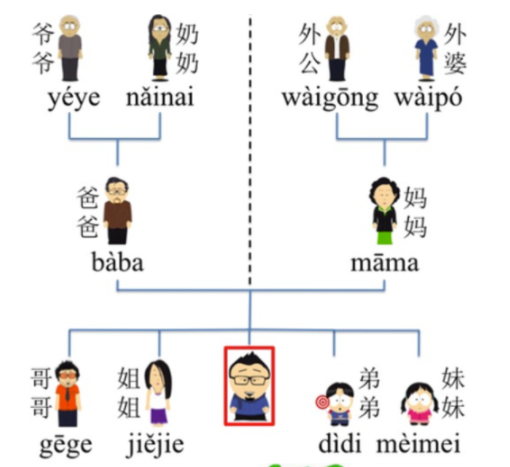
Pre task Activities:
zhè shì wǒ mā mā
这 是 我 妈 妈. (This is my mum)
Dialogue
nǐ mā mā jiào shén me ?
你 妈 妈 叫 什 么? (What is your mum's name?)
wǒ mā mā jiào ......
我妈妈叫...... ( My mum’s name is ......)
tā jǐ suì?
她几 岁? ( How old is she?)
tā sì shí suì
她 四 十 岁 。 ( She is 40 years old)
tā shǔ shén me ?
她 属 什 么? ( What is her birth sign?)
tā shǔ mǎ
她 属 马 (She is a horse)
Activities
1. Quizlet games on your device on https://quizlet.com/192318050/happy-chinese-i-lesson-4-ba-ba-ma-ma-flash-cards/?new
2.Tasks on Education Perfect.
3. Kahoot game on https://create.kahoot.it/#quiz/fb15c598-5f32-42e3-8dd8-bf4f880ef767
4. Task. Find a family photo and name each one in the photo in Mandarin. Say this to your family members and teach them. Use the sentence below.
zhè shì mā mā
这 是 妈 妈. (This is Mum)
5. Write the above sentence in your Mandarin book.
-
Year 7 Mandarin Assessment: A speech Assignment
-
EXPLORE / TŪHURA learning intentions:
We are exploring Chinese cultural festivalsWe are exploring basic Chinese vocabulary
We are exploring Chinese alphabet and pronunciation
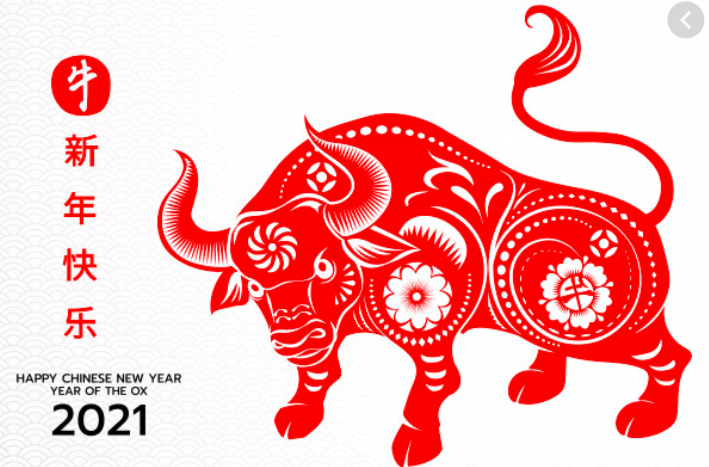
Learning Intentions: We are learning to (WALT)...Appreciate and participate in Chinese New Year celebrations
Success Criteria: I can
Retell a Chinese New Year story
Greet people with "Happy New Year" in Mandarin and sing a " Happy New Year" song
Make Chinese New Year paper cutting
Motivation
Watch a promotion videos on http://www.ilep.ac.nz/about/news-and-events/ilep-video
& onWatch a Chinese New Year story "Nian" on Answer the following questions.
What is "Nian"?
Why is New Year called " guo Nian"?
What were the things "Nian" was afraid of?
Explain the reasons why Chinese people use bright red colours and let off fireworks for the New Year.
2. Learn a Chinese New Year song "xin nian hao ya" on
3. . Kahoot games on
https://create.kahoot.it/details/chinese-new-year-quiz-mhjc/01c3b416-e9b1-4fd2-b704-75b3e522eb4f
Glossary
xīn. nián níu
新 new 年 year 牛 ox
nǐ hǎo
你 you 好 good
nǐ hǎo
你 好 hello
wǒ ne
我 I, me 呢 used at the end of a sentence, indicates it is a question
Homework
Sing along the songs uploaded on your Mandarin Google classroom.
Follow Up Tasks:
Quizlet on https://quizlet.com/263969930/spring-festival-mhjc-flash-cards/
Chinese New Year activities: papercutting
-
EXPLORE / TŪHURA learning intentions:
- We are EXPLORING basic Chinese vocabulary
- We are EXPLORING Chinese alphabet and pronunciation
FOCUS / ARONGA learning intentions:
- We are learning to Introduce ourselves to others
Success Criteria: I can
• Tell others my name and nationality
Activities:
Icebreaker. In Mandarin, introduce yourself to others and ask for their names. Write down at least 10 students' names.
1. Watch a video on
“Where are you from" " 你是哪国人?" . Discuss today's learning
intentions and success criteria.
2. Practise listening and speaking on Quizlet game on
https://quizlet.com/145778647/self-introduction-flash-cards/
Glossary
nǐ
你 you
wǒ
我 I, me
jiào
叫 is called
shì
是 am, is, are
tā
她 she
tā
他 he
guó jiā
国 家 country
rén
人 people
zhōng guó
中 国 China
wǒ jiào
我 叫....... My name is ......
nǐ shì nǎ guó rén
你 是 哪 国 人? Which country are you from?
wǒ shì xīn xī lán rén
我 是 新 西 兰 人 I am a New Zealander.
wǒ shì zhōng guó rén
我 是 中 国 人 . I am Chinese.
Formulaic Expressions
nǐ jiào shén me?
你 叫 什 么 ? What is your name?
wǒ jiào
我 叫....... My name is ......
Nǐ ne?
你 呢? How about you?
"Nathan" zěn me pīn
"Nathan" 怎 么 拼? How do you spell "Nathan"?
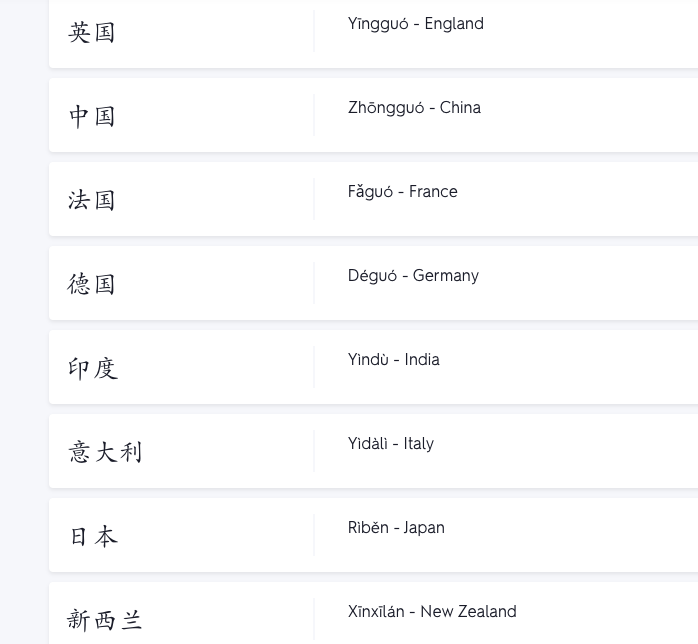
-
EXPLORE / TŪHURA learning intentions:- We are EXPLORING basic Chinese vocabulary
- We are EXPLORING Chinese alphabet and pronunciation

FOCUS / ARONGA learning intentions:
We are learning about countries and nationalities
Success Criteria: I can
Say my nationality and which country I live in
Activities
Quizlet game on https://quizlet.com/523364422/countries-nationalities%E5%9B%BD%E5%AE%B6-flash-cards/
Task on Education Perfect Unit 5: Countries and NationalitiesGlossary
zhù
住 live
lái zì
来 自 come from
Wǒ zhù zài xīn xī lán
我住 在新 西 兰 。( I live in New Zealand.)
Wǒ láizì Zhōngguó
我来自中国。( I come from China. )
Wǒ láizì yìn dù
我来自印度。 ( I come from India. ) -
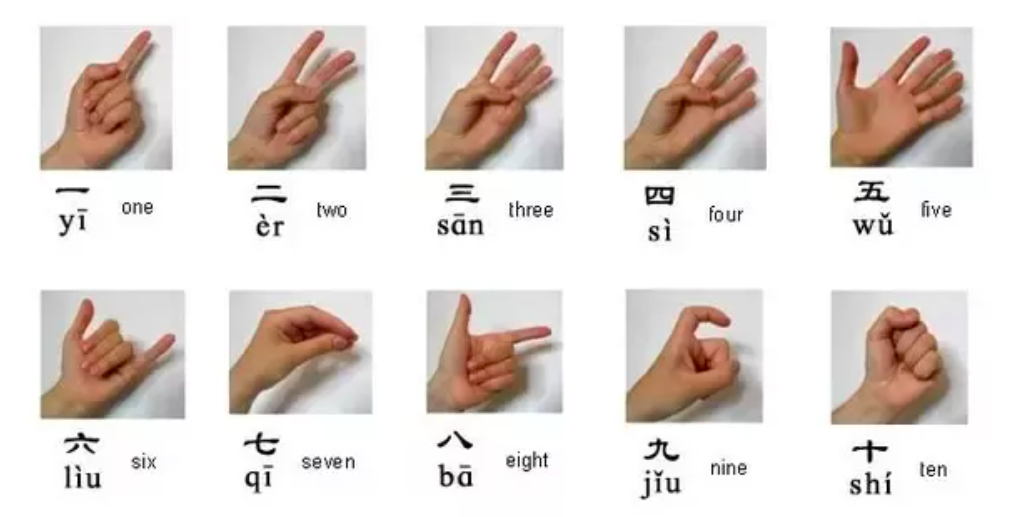
EXPLORE / TŪHURA learning intentions:
- We are EXPLORING basic Chinese vocabulary
- We are EXPLORING Chinese alphabet and pronunciation
FOCUS / ARONGA learning intentions:
- We are learning numbers 1- 10 in chinese
Success Criteria: I can
Match numbers 1-10 with their chinese words.
Represent numbers 1-10 with gestures
Motivation
Number song on
Activities:
1. The teacher introduces numbers 1-10 in chinese and demonstrates the hand gestures for numbers.
2. Group Activities a. matching game b. Task on Education Perfect c. Quizlet game on https://quizlet.com/196697217/chinese-numbers-1-10-flash-cards/
3. Kahoot game on numbers https://create.kahoot.it/#quiz/0c7a627a-c82e-43b1-ad4b-29f5c8edb2ae
4. Task. Students go around and ask each other their telephone numbers. They have to talk to at least 10 people in the class.
Glossary
零 líng zero
一 yī one
二 èr two
三 sān three
四 sì four
五 wǔ five
六 liù six
七 qī seven
八 bā eight
九 jiǔ nine
十 shí ten
十一 shí yī eleven
-
EXPLORE / TŪHURA learning intentions:
- We are EXPLORING basic Chinese vocabulary
- We are EXPLORING Chinese alphabet and pronunciation
FOCUS / ARONGA learning intentions:
We are learning how to ask someone's age and how to reply.
We are learning how to ask someone's year level and how to reply
Success Criteria: I can
Communicate with others about age and year level
Tasks on Education Perfect : Unit 4 Age & Year level
Watch a video on
Glossary
suì
岁 years old
nián jí
年 级 grade
Nǐ jǐ suì?
你 几 岁? ( How old are you?)
Wǒ shí yī suì
我 十 一 岁 。 ( I am 11 years old)
Wǒ shí èr suì
我 十 二 岁 。 ( I am 12 years old)
nǐ shàng jǐ nián jí
你上几年级? ( Which grade are you in?)
wǒ shàng qī nián jí
我上七年级. ( I am in Year 7)
-
EXPLORE / TŪHURA EXPLORE / TŪHURA learning intentions:- We are EXPLORING basic Chinese vocabulary
- We are EXPLORING Chinese alphabet and pronunciation
- We are EXPLORING Chinese cultures and festivals
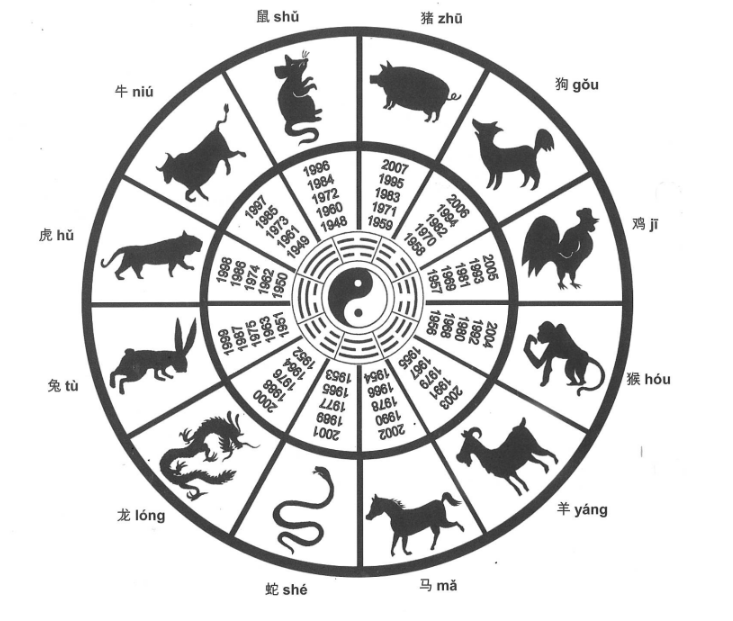
Learning intentions: we are learning to (walt)...
• Recognise the names of the 12 animals in the Chinese zodiac
• Talk about Chinese Zodiac signs
Success criteria: I can
• Match the names of the animals with their pictures
• Tell others how old I am and my Chinese zodiac sign
Motivation
Chinese zodiac story on
Activities:
Quizlet game on https://quizlet.com/30846634/flashcards
Mandarin readers. Read out aloud.
Education Perfect task Unit 8.2
Kahoot game on https://create.kahoot.it/details/chinese-zodiac/b54fe4c7-d15c-4c0b-851a-d75ed69659d4
Glossary
Nǐ shǔ shén me ?
你 属 什 么? ( what is your birth sign?)
Wǒ shǔ hǔ
我 属 虎。 (My birth sign is a tiger ) born in 2010
Wǒ shǔ níu
我 属 牛 。(My birth sign is an ox) -born in 2009
-
EXPLORE / TŪHURA EXPLORE / TŪHURA learning intentions:- We are EXPLORING basic Chinese vocabulary
- We are EXPLORING Chinese cultures and festivals
- We are exploring Chinese cuisine
Learning Intentions: We are learning to (WALT)...
recognise the importance of food in Chinese culture
order some traditional Chinese dishes
Success Criteria: I can
explain the reason why Chinese have certain foods for special occasions
say the names of some traditional Chinese dishes
Motivation:
Watch a video on
Activities:
1. Tasks set up on Education Perfect.
2. Quizlet game on CMEK 2 Lesson 14-我喜欢吃面包Flashcards
3. Write the following words in your Chinese workbook.
Glossary
yào
要 want
chī
吃 eat
xǐ huān
喜欢
like
shuǐ jiǎo
水饺 dumplings
miàn tiáo
面条
noodles
Sentence Patterns
nǐ yào shén me?
你 要 什 么? ( What do you like to have/order?)
wǒ yào .......
我 要 ...... ( I want to have/order ......)
nǐ xǐ huān shén me?
你 喜欢 什 么? ( What do you like to eat?)
wǒ xǐ huān shuǐ jiǎo
我喜欢水饺。 ( I like dumplings. ) -
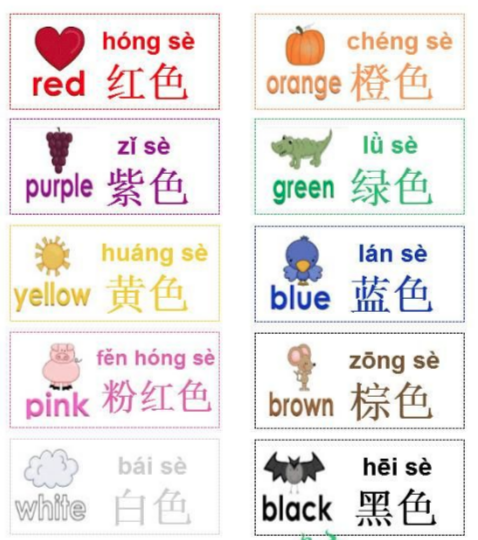
EXPLORE / TŪHURA EXPLORE / TŪHURA learning intentions:
• We are EXPLORING basic Chinese vocabulary
• We are EXPLORING different colours in Chinese
• We are learning to express my likes and dislikes of colours
Success Criteria: I can
• match the right colour with its Chinese name
• Discuss with others my likes and dislikes of colours
Motivation
Watch a tutorial on
Watch a video about the colours you can find in Forbidden City
Listen to a song on
Activities:
1.Task on Education Perfect Unit 6 : Colours
2. Quizlet game on https://quizlet.com/291390718/%E9%A2%9C%E8%89%B2-flash-cards/
3. Colour in a picture following instructions.
Formumlaic Instructions
zhè shì shí me yán sè ?
这是什么颜色? ( What colour is this?)
zhè shì hóng sè
这是红色。 (This is red.)
wǒ xǐ huān hóng sè
我喜欢红色。 ( I like red. )
wǒ bú xǐ huān hēi sè
我不喜欢黑色。 ( I don’t like black.)
-
Task on Education Perfect.
-
Task on Education Perfect.
New Zealand Chinese Language Week activities.
-
School holidays
-
School holidays
-
Task on your Google Classroom.
